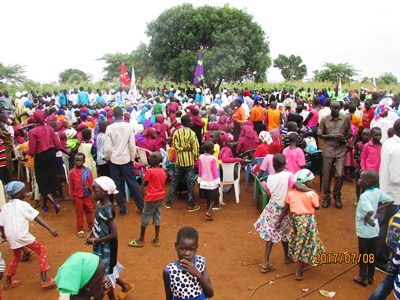S. Sudanese refugees say independence was “peoples’ struggle”
July 9, 2017 (KAMPALA) – South Sudan marked six years of independence on Sunday, despite the fact that about six million South Sudanese people or more than half of the country’s population are grappling with extreme food insecurity.

Two years after South Sudan gained independence from Sudan in 2011, President Salva Kiir accused his former vice president of plotting a coup against his regime, triggering the violence that has killed thousands of people.
Also, a peace deal signed in 2015 collapsed amid renewed violence outbreak.
On Sunday, however, thousands of South Sudanese refugees who live at Kiranyandongo resettlement camps in Uganda turned out to celebrate South Sudan’s sixth independence anniversary, amid calls for peace and stability.
A number of those interviewed expressed disappointment with the country’s leaders for failure to hold the country together after just two years of self-rule.
40-year old Rebecca Nyakueth said the independence anniversary reminded her of the decades of the political struggle South Sudan had with Khartoum.
“I was forced to flee this country [South Sudan] due to conflict, but I still had hope for a peaceful South Sudan,” said Nyakueth who blames the country’s politicians for the ongoing conflict that has negatively impacted on the nation.
James Omujwok, another refugee, said the independence commemoration was something that reflects of the people of South Sudan as a country.
“South Sudan’s independence will remain in our choice and memories as usual. It is the day we decided in self-determination as South Sudanese to give birth to the 54th African state. I believe that one day one time, that power abused by individuals will return to us,” he told Sudan Tribune on Sunday.
More than 98% of the South Sudanese population voted for separation from neighbouring Sudan. The referendum vote was a key part of the 2005 Comprehensive Peace Agreement (CPA), which ended decades of civil wars.
In a separate interview, Stephen Waat Bipal, the armed opposition faction (SPLM-IO) chapter chairman in Kampala has told Sudan Tribune that the independence of South Sudan was neither for the government nor the SPLM-IO.
“South Sudan is our country; we need to remember this day for the country’s history. South Sudan is not a bad country, but leaders who are in the top management are the ones who make it sound bad”, said Bipal.
The official commended the South Sudanese communities who preach, but warmed that those who incite the population will never help restore stability.
“It is important we restore peace. Together as South Sudanese, I believe we can make it a great nation if we buried ideological of tribal mindsets,” he stressed.
South Sudan’s mass displacement has created the fastest-growing refugee crisis in the world. Almost two million people have fled the country, including nearly one million who have crossed into neighboring Uganda, according to the Norwegian Refugee Council. Another two million are internally displaced.
President Salva Kiir said his administration was forced to call off the celebration of sixth independence day because of the economic crisis with which the country was battling to address since the eruption of the armed conflict in December 2013.
“We did not feel that it was appropriate to spend whatever little funds we may have to celebrate when our people are hugely affected by the economic crisis that has made it difficult for many people to afford even one meal per day,” said Kiir in a message issued in commemoration of South Sudan’s Independence on Sunday.
“Although the famine, which was declared in some parts of our country, has now been contained, still thousands of our citizens are under threat of food insecurity,” he added.
The South Sudan leader called on the international community to support the national dialogue, which he declared last year, saying it was the only option for the country to address all the differences which were caused the ongoing conflict.
(ST)
